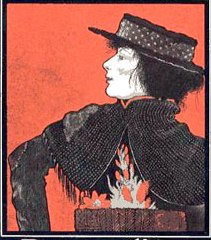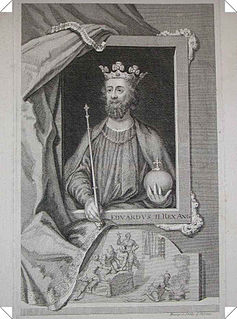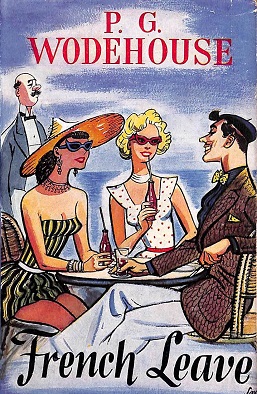
A Doll's House is a three-act play written by Norway's Henrik Ibsen. It premiered at the Royal Theatre in Copenhagen, Denmark, on 21 December 1879, having been published earlier that month. The play is set in a Norwegian town circa 1879.

Around the World in Eighty Days is an adventure novel by the French writer Jules Verne, published in 1873. In the story, Phileas Fogg of London and his newly employed French valet Passepartout attempt to circumnavigate the world in 80 days on a £20,000 wager set by his friends at the Reform Club. It is one of Verne's most acclaimed works.

Helena Bonham Carter is an English actress. She is known for her roles in both low-budget independent art films and large-scale blockbusters. She was nominated for the Academy Award for Best Actress for her role as Kate Croy in The Wings of the Dove (1997). For her role as Queen Elizabeth in The King's Speech (2010), she was nominated for the Academy Award for Best Supporting Actress and won the BAFTA Award for Best Actress in a Supporting Role. She also won the 2010 International Emmy Award for Best Actress for her role as British author Enid Blyton in the TV film Enid (2009).

Henry V is a 1944 British Technicolor film adaptation of William Shakespeare's play of the same name. The on-screen title is The Chronicle History of King Henry the Fift with His Battell Fought at Agincourt in France. It stars Laurence Olivier, who also directed. The play was adapted for the screen by Olivier, Dallas Bower, and Alan Dent. The score is by William Walton.

Anna Louise Friel is an English actress. Born in Rochdale, Greater Manchester, she has been acting professionally since age 13. Friel achieved fame with her portrayal of Beth Jordache on the British soap opera Brookside (1993–95), and came to international prominence when she played Charlotte "Chuck" Charles on ABC's Pushing Daisies (2007–09). She is the recipient of several accolades, including an Emmy Award, a Drama Desk Award, a National Television Award, an RTS Award, and an honorary degree, as well as BAFTA Award, Golden Globe Award, Satellite Award, Saturn Award, Genie Award and Czech Lion Award nominations.

Dame Kristin Ann Scott Thomas is an English actress. Five times a BAFTA Award nominee and five-times Olivier Award nominee, she won the BAFTA Award for Best Actress in a Supporting Role for Four Weddings and a Funeral (1994) and the Olivier Award for Best Actress in 2008 for the Royal Court revival of The Seagull. She was also nominated for the Academy Award for Best Actress for The English Patient (1996).

The Ebony Tower (1974) by John Fowles is a collection of five novellas and short stories with interlacing themes, each built around a medieval myth: The Ebony Tower, Eliduc, Poor Koko, The Enigma and The Cloud.

Christopher James Hampton, CBE, FRSL is a British playwright, screenwriter, translator and film director. He is best known for his play based on the novel Les Liaisons dangereuses and the film version Dangerous Liaisons (1988) and also more recently for writing the nominated screenplay for the film adaptation of Ian McEwan's Atonement.

Cyrano de Bergerac is a play written in 1897 by Edmond Rostand. There was a real Cyrano de Bergerac, and the play is a fictionalisation following the broad outlines of his life.
A film adaptation is the transfer of a work or story, in whole or in part, to a feature film. Although often considered a type of derivative work, recent academic developments by scholars such as Robert Stam conceptualize film adaptation as a dialogic process.

Pygmalion is a play by George Bernard Shaw, named after a Greek mythological figure. It was first presented on stage to the public in 1913.

Sir John Selby Clements, CBE was an English actor and producer who worked in theatre, television and film.

Thank You, Jeeves! is a 1936 comedy film directed by Arthur Greville Collins, written by Stephen Gross and Joseph Hoffman, and starring Arthur Treacher, Virginia Field, David Niven, Lester Matthews, Colin Tapley and John Graham Spacey. It was released on October 4, 1936, by 20th Century Fox.

Edward II of England has been portrayed in popular culture a number of times.

Oliver Mansour Jackson-Cohen is an English actor and model.

Scrooge, or, Marley's Ghost is a 1901 British short silent drama film, directed by Walter R. Booth, featuring the miserly Ebenezer Scrooge confronted by Marley's ghost and given visions of Christmas past, present, and future, is the earliest known film adaptation of Charles Dickens's 1843 novel A Christmas Carol. The film, "although somewhat flat and stage-bound to modern eyes," according to Ewan Davidson of BFI Screenonline, "was an ambitious undertaking at the time," as, "not only did it attempt to tell an 80 page story in five minutes, but it featured impressive trick effects, superimposing Marley's face over the door knocker and the scenes from his youth over a black curtain in Scrooge's bedroom."
Woman to Woman is a 1929 British drama film directed by Victor Saville and starring Betty Compson, George Barraud and Juliette Compton. The film was an adaptation of the play Woman to Woman by Michael Morton which had previously been made into a film in 1923.

Seven Days Leave is a 1930 American Pre-Code drama film produced and directed by Richard Wallace and starring Gary Cooper, Beryl Mercer, and Daisy Belmore.
Leave It to Me is a 1933 British comedy film directed by Monty Banks and starring Gene Gerrard, Olive Borden and Molly Lamont. It was made at Elstree Studios. The film's sets were designed by the art director David Rawnsley. It is an adaptation of the play Leave it to Psmith (1930) by Ian Hay and P.G. Wodehouse, which was based on Wodehouse's novel Leave it to Psmith (1923).
Faust aux enfers, released in the United States as The Damnation of Faust and in Britain as The Condemnation of Faust, is a 1903 French short silent film directed by Georges Méliès.


















